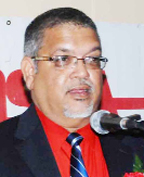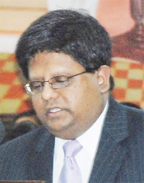Chairman of the Private Sector Commission (PSC) Ramesh Dookhoo has reacted sharply to claims made in the April 2010 Guyana Country Review published by the Economist Intelligence Unit (EIU) that the private sector is timid of criticizing the political administration, asserting that there is no reason for the private sector to be intimidated by government.

“We are not afraid of the government,” Dookhoo said. “That is not the case. What is true is that there are occasions when there are disagreements over issues but I believe that on both sides there is a recognition that we are working towards the same goals. When we disagree we settle those disagreements.”
Last Friday’s front page story and editorial published in this newspaper and which elicited an angry response from Finance Minister Dr Ashni Singh, quoted the EIU Report as asserting that while there exists, on the part of the private sector, “a widespread level of frustration with government policy” there is also “the widespread perception that criticism of the authorities will result in the loss of fiscal and other concessions”. However, Dookhoo, in an invited comment, challenged the EIU’s assertion that the private sector is afraid that criticism of the political administration will result in the withdrawal of concessions that are already given. “When such concessions are given they are given. The issue of withdrawing them does not arise,” he said.
The PSC Chairman told Stabroek Business he was concerned that there may be a perception in some quarters that the private sector needed to be “in a kind of permanent conflict with the government” in order to demonstrate that it had no fear of the political directorate. That perception has to change, he said. “This is not a war, it is a partnership. The government and the private sector have to work together to build the economy and it follows that our relationship has to exist in an environment where differences are settled through negotiations. It is true that sometimes there are tough issues the require us to negotiate but you cannot expect that those negotiations can be conducted in the full glare of the public.”
Some private sector officials have, in recent times, voiced concern over issues which they regard inimical to business interests, notably, the slow pace of tax reforms, bottlenecks within the Customs and Trade Administration and bureaucratic hurdles to expediting procedures for foreign investment. It is, however, uncommon for the private sector to publicly ‘lock horns’ with government over policy issues. This approach, Dookhoo told Stabroek Business is consistent with a partnership that favours “negotiated solutions” to differences.

Last week, in a statement issued through the Government News Agency (GINA) Dr Singh dismissed the EIU Report on the Guyana economy as “misinformed, distorted, warped and totally inaccurate”. He slammed questions raised in the document regarding the veracity of official figures tendered to support his announcement in the country’s 2010 budget that the economy had grown by 2.3% last year. In a brusque statement, the minister charged that the EIU’s “coverage on Guyana” had been “hijacked by partisan domestic political operatives” including head of the accounting firm of Ram and McRae, Christopher Ram, who the GINA release said was “the principal author” of the EIU survey. Additionally, the minister chided this newspaper over what he said were “insinuations… on the accuracy of the statistics.”
In taking issue with the government’s estimate of real GDP growth of 2.3% last year the EIU Report cited “severe contractions” in production in the first three quarters of the year. “To attain real GDP growth in 2009 would have required an incredibly strong growth rate in the October-December quarter. This appears unlikely considering that agricultural production – a key driver of economic growth remained weak overall during the period. Moreover, with import compression thought to have made a major contribution, the government’s GDP estimate for 2009 masks the weakness in the real economy,” the report said.
Meanwhile, the EIU report described as “overly optimistic” the projected growth rate of 4.4% announced in the finance minister’s 2010 budget presentation. It noted that the projected growth rate assumed a strong performance by the sugar sector adding that “while the sugar sector can be expected to perform relatively well owing to expanded production capacity, the government’s projection of output growth of 19.8% is highly ambitious.” The report added that while a return to “modest positive growth” is expected, “private consumption will remain weak owing to high unemployment and still depressed levels of workers’ remittances”, which “will remain vulnerable to a renewed downturn in the US economy in 2011”.
In its assessment of the country’s economic policy outlook in the period ahead the EIU report said the government could face challenges associated with improving the implementation of governance reforms, particularly in the areas of procurement and financial monitoring and addressing the issue of competitiveness, including improvements in the business environment. In this context, it noted as well that government’s “national competitiveness strategy will focus on addressing weaknesses in infrastructure – particularly roads, power, irrigation, sanitation and housing – the regulatory regime, tax and trade policy and access to financing among other things.”





